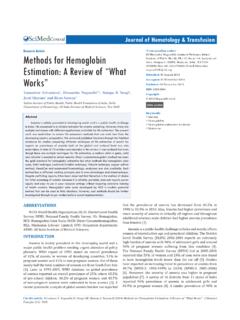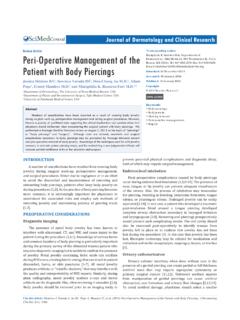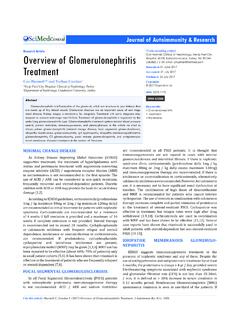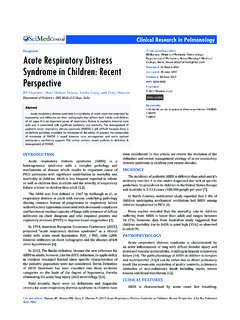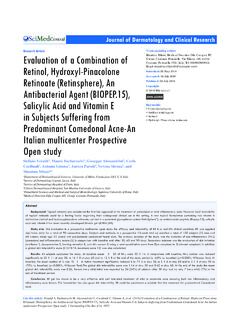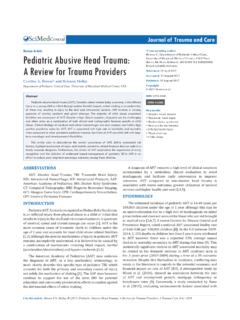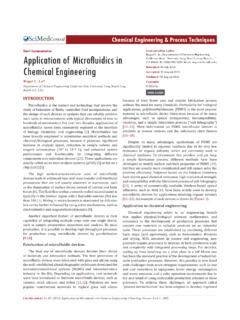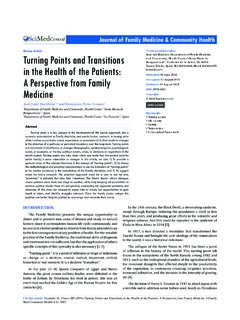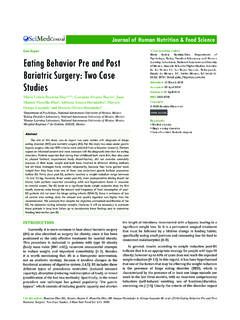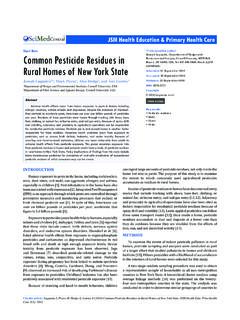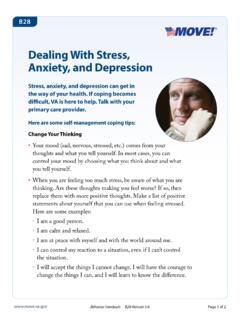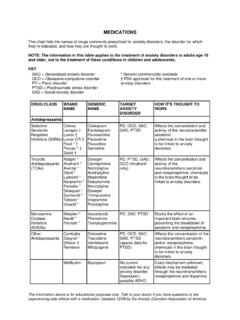Transcription of Chronic Stress Leads to Anxiety and Depression
1 CentralAnnals of Psychiatry and Mental HealthCite this article: Khan S, Khan RA (2017) Chronic Stress Leads to Anxiety and Depression . Ann Psychiatry Ment Health 5(1): 1091.*Corresponding authorRafeeq Alam Khan, Department of Pharmacology, Faculty of Pharmacy, University of Karachi, Karachi-75270, Pakistan, Email: Submitted: 04 November 2016 Accepted: 25 January 2017 Published: 27 January 2017 Copyright 2017 Khan et : 2374-0124 OPEN ACCESS Keywords Chronic Stress Anxiety disorders Depression Short CommunicationChronic Stress Leads to Anxiety and DepressionSarah Khan1 and Rafeeq Alam Khan2*1 Department of Psychology, University of Karachi, Pakistan2 Department of Pharmacology, Faculty of Pharmacy, PakistanAbstractStudies have found a link between Chronic Stress and Anxiety disorders as well as major depressive disorder.
2 This article reviews literature based on that keeping in view the physiology of Stress and its consequences on psychological well-being of a person. If untreated, Stress however downplayed at times, could be word Stress implies an experience of negative emotions that comes in the wake of anticipated physiological, biochemical, cognitive and behavioral changes that work towards either changing the stressor or making adjustments to its effects [1]. Stress is a process that puts the bodily systems under strain in order to cope with the environmental demands that bring about psychological and biological changes that could account for an illness [2]. The environmental aspect highlights the evaluation of environmental situations that are in objective relation with the extensive adaptive demands.
3 The subjective assessment of the ability to cope with the stressor comes under the domain of psychological Stress perspective. Finally, the biological perspective refers to the multiple bodily systems that are activated and controlled by both psychologically and physically demanding situations [3]. If the Stress is continued or prolonged, it can leave adverse effects on body s immune, cardiovascular, neuroendocrine and central nervous systems [4]. When Chronic Stress goes untreated it can result into serious disabilities like insomnia, weakened immune system, high blood pressure, Anxiety and muscle pain. It can also play a role in developing major disorders like Depression , heart disease and obesity [5].The pathway between Stress and mental illness can be better understood with a thorough comprehension of physiology of Stress .
4 There are two interconnected systems that are involved when experiencing stressful events; sympathetic adreno-medullary (SAM) system and hypothalamic-pituitary-adrenocortical (HPA) axis. In SAM activation, when a person is faced with a stimulus that disturbs his homeostasis it is labeled as a stressor by the cerebral cortex. This information travels to the hypothalamus which initiates the fight or flight response. This stimulates the adrenal medulla to secrete the catecholamine (epinephrine and norepinephrine). The combined effect of two produces an aroused bodily system high blood pressure, sweating, palpitation, constriction of blood vessels etc. While in HPA activation, hypothalamus is known to secrete corticotrophin-releasing hormone (CRH).
5 It rouses pituitary gland which in turn releases adrenocorticotropic hormone (ACTH). This stimulates the adrenal cortex to secrete glucocorticosteriods. Among these, cortisol is the most important. It stores carbohydrate and decreases inflammation and helps the body returning to its original, steady state before the Stress [6]. Prolonged HPA activation due to continued Stress has been related with serious diseases. Various researchers have proposed that the consequences of HPA activation on health are far more significant than that of sympathetic arousal [7,8]. Below is a flow chart presented by Baum (1994) that shows how Stress could influence health through certain behavioral acts, first, by affecting health habits straight and secondly by meddling with the treatment procedure and the use of health services [9].
6 It is evident how physiological arousal could lead to maladaptive patterns of behavior which would eventually influence a person s attitude towards seeking help and care. Evidences have been found that the combination of emotional arousal and neuroendocrine stimulation due to prolonged Stress causes Chronic insomnia [10]. As sleep is imperative for body s restoration, its disturbance and deficiency implies a significant pathway to disease [11]. A study in 2006 by Ardayfio and colleague showed how Chronic Stress could lead to Anxiety and Depression . It presented that prolonged exposure to Stress hormone, cortisol, contributed to symptoms of Depression . According to this study, Stress hormones help a person in responding to an immediate threat [12,13].
7 However, if Stress remains heightened, it could boost Anxiety and lead to mood disorder or most commonly major depressive. Repeated or recurrent Stress is known to quicken or worsen the mood disorders [14,15]. Anxiety disorders, according to diagnostic and statistical manual of mental disorders (DSM IV-TR) include panic disorders (characterized by frequent panic attacks, somatic and autonomic indications of fear), generalized Anxiety disorder (prolonged Anxiety accompanied with overpowering, extreme worry CentralKhan et al. (2017)Email: Ann Psychiatry Ment Health 5(1): 1091 (2017) 2/4about nominal and significant matters alike), phobic disorders (that includes agoraphobia, social and specific phobia an irrational, uncontrollable fear of an object or situation), post-traumatic Stress disorder (characterized by intrusive, unpleasant thoughts of the trauma once experienced manifested through troubled behavioral actions) and obsessive compulsive disorder (persistent, irrepressible thoughts, imagery or actions) [16].
8 Studies have shown how early exposure to stressors in life and sensitivity to Stress make a person susceptible to the mentioned disorder [17-25]. Early life stressor has the power to bring about noticeable and durable changes in brain circuitry regulating Stress reactivity, mood and behavior [17]. Impairment in central nervous system may take place due to early stressful life events [26] and change in Stress response system that can last through adulthood [27-29]. The HPA activation due to physically and psychologically stressful experiences produces cortisol as explained above which in turn negatively impacts mood and behavior [30,31].Major Depressive Disorder among other psychotic disorder is one of the most prevalent disorders with the lifetime prevalence of more than 17% in the general population [32].
9 Researchers have associated elevated cortisol level in bloodstream to be one of the major causes of MDD as a result of HPA hyperactivation [33,34].CRH has also been found to create symptoms of both Anxiety and Depression in animals including low appetite, decreased libido, and abnormal reaction to new stimuli, troubled sleep and changes in locomotor activity [35,36]. Heightened CRH is not an indicator of Depression rather it is a state as it goes back to normal when Depression is treated [37]. People with cognitive impairment, a distinct indicator of Depression , have shown abnormalities in HPA activation [38-40]. The other way around HPA axis deregulation has been found in patients with severe depressive and psychotic symptoms [41].
10 Moreover, reduced glucocorticoids concentration in response to HPA activation along with heightened negative feedback has been known to cause depressive symptoms as well which signifies that either abnormally heightened or reduced HPA activation in response to Stress is related with the occurrence of depressive symptoms [42]. Also, studies have supported the idea that elevated cortisol damages hippocampus that is the part of the brain responsible for memory that in turn may cause unusual behavior observed in depressed patients [43-46]. It has been known that exposure to Stress prevent neurogenesis in the adult hippocampus [47-49]. A recent literature review proposed that prolonged Stress and pathological Anxiety are responsible for causing structural degeneration in the brain and reduced functioning of hippocampus and the prefrontal cortex which in return increase the risk of development of disorders like Depression and Anxiety [50].
